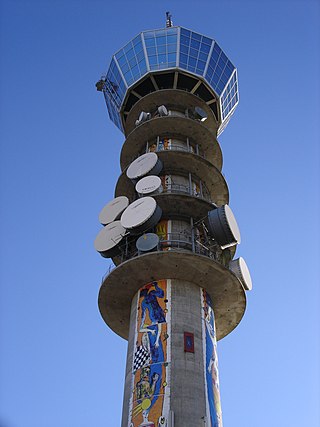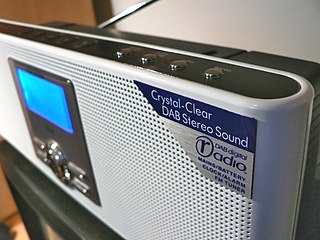Related Research Articles

Medium wave (MW) is a part of the medium frequency (MF) radio band used mainly for AM radio broadcasting. The spectrum provides about 120 channels with more limited sound quality than FM stations on the FM broadcast band. During the daytime, reception is usually limited to more local stations, though this is dependent on the signal conditions and quality of radio receiver used. Improved signal propagation at night allows the reception of much longer distance signals. This can cause increased interference because on most channels multiple transmitters operate simultaneously worldwide. In addition, amplitude modulation (AM) is often more prone to interference by various electronic devices, especially power supplies and computers. Strong transmitters cover larger areas than on the FM broadcast band but require more energy and longer antennas. Digital modes are possible but have not reached momentum yet.

Radio broadcasting is the broadcasting of audio (sound), sometimes with related metadata, by radio waves to radio receivers belonging to a public audience. In terrestrial radio broadcasting the radio waves are broadcast by a land-based radio station, while in satellite radio the radio waves are broadcast by a satellite in Earth orbit. To receive the content the listener must have a broadcast radio receiver (radio). Stations are often affiliated with a radio network that provides content in a common radio format, either in broadcast syndication or simulcast, or both. The encoding of a radio broadcast depends on whether it uses an analog or digital signal. Analog radio broadcasts use one of two types of radio wave modulation: amplitude modulation for AM radio, or frequency modulation for FM radio. Newer, digital radio stations transmit in several different digital audio standards, such as DAB, HD radio, or DRM.

Absolute Radio is a British digital radio station owned and operated by Bauer Media Audio UK as part of the Absolute Radio Network. It broadcasts nationally across the UK via digital audio broadcasting.
RPH Australia is the national peak representative organisation for a unique Australian network of radio reading services designed to meet the daily information needs of people who, for any reason, are unable to access printed material. It is estimated that 22% of the Australian population has a print disability.
2CH was a commercial radio station in Sydney, Australia, which closed on 10 June 2022, after more than 90 years on the air. It was owned by Pacific Star Network.
Greatest Hits Radio South Wales is an Independent Local Radio station owned and operated by Bauer Radio as part of the Greatest Hits Radio network. The station broadcasts to Swansea, Neath Port Talbot, Llanelli and South East Wales from studios in the Llansamlet area of Swansea on DAB.

Absolute Classic Rock is a national digital radio station owned and operated by Bauer as part of the Absolute Radio Network. Its music output is non-stop classic rock hits.
MFR is an Independent Local Radio station based in Inverness, owned and operated by Bauer Media Audio UK as part of the Hits Radio Network. It broadcasts to Moray, Scottish Highlands and North West Aberdeenshire.

HD Radio (HDR) is a trademark for an in-band on-channel (IBOC) digital radio broadcast technology. HD radio generally simulcasts an existing analog radio station in digital format with less noise and with additional text information. HD Radio is used primarily by AM and FM radio stations in the United States, U.S. Virgin Islands, Canada, Mexico and the Philippines, with a few implementations outside North America.

Laser 558 was an offshore pirate radio station launched in May 1984 using disc jockeys from the US. It broadcast from the Panama-registered ship MV Communicator in international waters in the North Sea. Within months the station had a large audience, due to its strong signal and continuous music, mixing current records with oldies. However, insufficient advertising starved the station off the air in late 1985. In 1986 an attempt was made to return as Laser Hot Hits, but the same problems arose.

FM broadcasting is a method of radio broadcasting that uses frequency modulation (FM) of the radio broadcast carrier wave. Invented in 1933 by American engineer Edwin Armstrong, wide-band FM is used worldwide to transmit high-fidelity sound over broadcast radio. FM broadcasting offers higher fidelity—more accurate reproduction of the original program sound—than other broadcasting techniques, such as AM broadcasting. It is also less susceptible to common forms of interference, having less static and popping sounds than are often heard on AM. Therefore, FM is used for most broadcasts of music and general audio. FM radio stations use the very high frequency range of radio frequencies.
Radio enjoys a huge following in the United Kingdom. There are around 600 licensed radio stations in the country. For a more comprehensive list see List of radio stations in the United Kingdom.

Manx Radio is the national commercial radio station for the Isle of Man. It began broadcasting on 29 June 1964, almost ten years before legal commercial radio was licensed in the United Kingdom. The Isle of Man, having its own government and laws, was not subject to the rules prohibiting commercial broadcasting in the UK. However, the Manx Government still had to apply to the UK's General Post Office for a frequency and for permission to broadcast. First requested in 1960, a licence was eventually granted in May 1964. It was allocated an FM frequency of 89.0 MHz and a comparatively low power of 50 watts. In October 1964, an additional frequency of 1594 kHz AM was allocated to the station to provide greater coverage, although again at a limited power of 50 watts. It broadcasts primarily in English with several hours per week of Manx language programming.
Radio Caroline is a British radio station founded in 1964 by Ronan O'Rahilly and Alan Crawford, initially to circumvent the record companies' control of popular music broadcasting in the United Kingdom and the BBC's radio broadcasting monopoly. Unlicensed by any government for most of its early life, it was a pirate radio station that never became illegal as such due to operating outside any national jurisdiction, although after the Marine, &c., Broadcasting (Offences) Act 1967 it became illegal for a British subject to associate with it.
Independent National Radio (INR) is the official term for the three national commercial radio stations currently or previously broadcasting on analogue radio in the United Kingdom, beginning in 1992. One station was allocated an FM licence, and the other two were allocated AM medium wave frequencies previously used by BBC Radio 3 and BBC Radio 1.

In the United Kingdom, the roll-out of digital radio has been proceeding since engineering test transmissions were started by the BBC in 1990 followed by a public launch in September 1995. The UK currently has one of the world's biggest digital radio networks, with about 500 transmitters, three national DAB ensembles, one regional DAB ensemble, 48 local DAB ensembles and an increasing number of small-scale DAB ensembles broadcasting over 250 commercial and 34 BBC radio stations across the UK. In London there are already more than 100 different digital stations available. In addition to DAB and DAB+, radio stations are also broadcast on digital television platform as well as internet radio in the UK. Digital radio ensemble operators and stations need a broadcasting licence from the UK's media regulator Ofcom to broadcast.
This is a list of events in British radio during 1990.

Free Radio was a regional group of Independent Local Radio stations in the West Midlands, owned and operated by Bauer Media Audio UK as part of the Hits Radio network.
Greatest Hits Radio Birmingham & The West Midlands is an Independent Local Radio station based in Birmingham, England, owned and operated by Bauer as part of the Greatest Hits Radio network. It broadcasts to the West Midlands. The station forms part of Greatest Hits Radio Midlands.
References
- ↑ "How to listen". Archived from the original on 13 February 2019. Retrieved 12 February 2019.
- ↑ "Spectrum Radio". Mondotimes. Archived from the original on 6 August 2024. Retrieved 5 March 2012.
- ↑ "Spectrum Radio Licence Format". Ofcom. Archived from the original on 3 August 2008. Retrieved 12 July 2013.
- ↑ "First & last". Offshoreechos.com. Archived from the original on 6 February 2007. Retrieved 4 November 2011.
- ↑ "Frequency change request for Love Sport and Panjab Radio". Radio Today. 11 February 2019. Archived from the original on 13 February 2019. Retrieved 12 February 2019.
- ↑ "Spectrum Radio Network Unveils New London Studios". 5 September 2019. Archived from the original on 16 January 2024. Retrieved 6 August 2024.
- ↑ "Liquidators appointed at Spectrum Radio Limited". 25 February 2020. Archived from the original on 9 November 2021. Retrieved 6 August 2024.